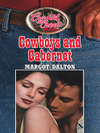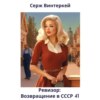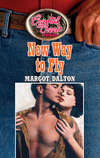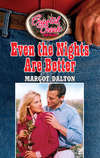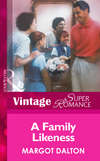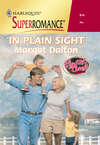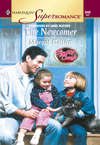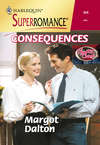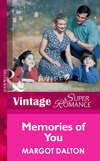Czytaj książkę: «Cowboys and Cabernet»
“I’m sure as hell not the father of that baby.”
Tyler’s voice was cold and level. “Listen, Ruth, I never touched Jodie Hiltz. I’d hardly know the girl if I saw her on the street.”
Ruth glanced up at him, aching to believe him. But Jodie’s words were carved into her memory: “He’s so handsome without his clothes…he has a birthmark on his left hip…shaped like a map of Texas….”
Ruth moaned softly. She remembered the sweet pleasure of the previous night when she and Tyler had made love, laughed and teased.
“Show me Amarillo,” he’d whispered.
Ruth forced herself back to the present. She looked hopelessly at Tyler. “Jodie wasn’t lying. Please take me home. I have to start packing.”
Special thanks and acknowledgment to Margot Dalton
for her contribution to the Crystal Creek series.
Special thanks and acknowledgment to Sutton Press Inc.
for its contribution to the concept for the Crystal Creek series.
Cowboys and Cabernet
Margot Dalton

Dear Reader,
Welcome to Crystal Creek! In the heart of Texas Hill Country, the McKinneys have been ranching, living and loving for generations, but the future promises changes none of these good folks could ever imagine!
Crystal Creek itself is the product of many imaginations, but the stories began to take shape when some of your favorite authors– Barbara Kaye, Margot Dalton, Bethany Campbell, Cara West, Kathy Clark and Sharon Brondos–all got together with me just outside of Austin to explore the Hill Country, and to dream up the kinds of romances such a setting would provide. For several days, we roamed the countryside, where generous Texans opened their historic homes to us, and gave us insights into their lives. We ate barbecue, we visited an ostrich farm and we mapped out our plans to give you the linked stories you love, with a true Texas flavor and all the elements you’ve come to expect in your romance reading: compelling, contemporary characters caught in conflicts that reflect today’s dilemmas.
Margot Dalton’s fascination with the burgeoning Texas wine industry finds expression in this captivating tale of Tyler McKinney, the eldest McKinney offspring, and Ruth Holden, a Californian with a string of impressive credentials in wine making to her name, and a measured, analytical, thoughtful approach to growing grapes that puts our poor frustrated cowboy right off his feed!
And next month, watch for Amarillo by Morning, the story of Cal, Tyler’s younger brother. An entrepreneurial young Texas bootmaker in search of an endorsement gets way more than she bargains for when she is bombarded by the formidable charms of rodeo rider Cal McKinney….
C’mon down to Crystal Creek–home of sultry Texas drawls, smooth Texas charm and tall, sexy Texans!
Marsha Zinberg
Executive Editor,
Crystal Creek
A Note from the Author
When Harlequin editors first approached me about writing these books, I was really nervous. I’d never even been to Texas…how could I write books about the place? But when my husband and I finally traveled to Austin for a research trip, I was amazed and delighted to find that I felt right at home. The countryside is truly big and beautiful—just like the hearts of the people. And Texas ranchers are every bit as colorful, rugged and lovable as their counterparts on the Canadian prairies where I grew up. They have the same hospitality and generosity of spirit, and that deep love for the land and its traditions that unites farmers and ranchers all over the world.
Now, when anybody mentions the place, I just smile and say, “Yeah, I love Texas. I’m even learning to speak the language.”
Margot Dalton
Cast of Characters
AT THE DOUBLE C RANCH




AT THE CIRCLE T RANCH

AT THE LONGHORN

CONTENTS
CHAPTER ONE
CHAPTER TWO
CHAPTER THREE
CHAPTER FOUR
CHAPTER FIVE
CHAPTER SIX
CHAPTER SEVEN
CHAPTER EIGHT
CHAPTER NINE
CHAPTER TEN
CHAPTER ELEVEN
CHAPTER TWELVE
CHAPTER THIRTEEN
CHAPTER ONE
THE WINTER CLOUDS rolled into California’s Napa Valley during January, dark and heavy, brooding on the craggy hilltops and drowning the sheltered valley in mist and rain. The fields that had so recently been alive with color and motion now lay dormant, their acres and acres of grapevines resting neat and bare in long trellised rows, stripped of leaves and fruit, awaiting the new growing season.
By late afternoon the light thinned and faded, then slipped away behind piled masses of clouds. Night fell early, a dank smothering blackness that rolled across the hills in a solid ominous mass, blocking the moon and stars.
Don Holden moved restlessly across his dining room and pulled the drapes aside, peering out into the darkness. He looked at his watch and frowned, then glanced through the rain-splattered window again, his face drawn with concern.
He was a slender, handsome man in his midfifties with dark graying hair, mild brown eyes and a carefully trimmed beard. He wore casual brown corduroy slacks, a soft flannel shirt and a tan cardigan with suede elbow patches, and looked like a college professor or a respected artist or sculptor.
In actual fact, though, Don Holden was a businessman, a self-made entrepreneur with one of the most successful privately owned vineyards and wineries in the Napa Valley. He was firm in business dealings, incisive, knowledgeable and tough, well-known throughout the region for his rugged independence and his uncanny instincts for the wine-making business.
But tonight, in the privacy of his own dining room, Don Holden presented a somewhat less confident demeanor than his business colleagues were accustomed to seeing. In fact, the man’s expression was positively timid when he turned away from the window and glanced through the wide Spanish archway leading to the kitchen, then peered anxiously out again into the rainy darkness.
Somewhere nearby a door opened suddenly, admitting a gust of damp air and a cool breath of freshness. Don’s shoulders sagged with relief and he crossed the room quickly, smiling at the damp person who stood dripping in the entrance hall.
The newcomer stripped off a hooded oilskin cape to reveal a slim body in high rubber boots, jeans, denim jacket and faded Oakland A’s baseball cap.
“For God’s sake, get those muddy boots off, girl,” Don said, trying to make his voice gruff, though he couldn’t quite hide the fond smile that tugged at his lips beneath his neat beard. “Look at you. You’re dripping all over the place.”
His daughter pulled off the boots and set them casually on a rubber tray beside the door, then removed her baseball cap to reveal a head of tumbled short brown hair and a face of gamine prettiness. Flushed with cold, dressed in casual clothes, Ruth Holden looked more like a thirteen-year-old than a woman of almost thirty, Don told himself. Her skin was creamy and perfect, just a trace of summer tan remaining, and her eyes were golden brown, warm with affection as she smiled at her father.
“Oh, quit fussing,” Ruth said mildly. “Here I am slaving away all day in the wet and cold, and do I get any appreciation for it? Not a bit.”
“You love it,” Don said, unmoved, leaning in the doorway and watching her. “You’d rather spend the day out there pruning and taking cuttings than doing anything else in the world. You know you’re just doing it for pure enjoyment. It’s still too early for pruning.”
Ruth chuckled and pulled off her denim jacket to reveal a blue plaid shirt buttoned warmly over a white turtleneck. “How come you’re so cranky, Dad?” she asked mildly. “You’re growling just like an old bear.”
Don rolled his eyes and threw a brief eloquent glance over his shoulder, then held out his watch.
Ruth peered at the time and gasped. She covered her mouth with a slim, dirt-smeared hand and gazed at the man in the doorway, her eyes wide and startled.
“Oh, God, I’m sorry,” she murmured contritely. “I honestly had no idea it was getting so late. Is she really mad?” Ruth lowered her voice, glancing down the hallway just as her father had moments before.
Don nodded. “The atmosphere is getting quite tense,” he reported solemnly.
“Oh, my. I’ll just run real quick and wash.” Ruth held up her cold muddy hands for his inspection. “If she comes in, tell her I’ll be back in a flash.”
“Don’t dawdle, then.”
Ruth nodded and hurried off down the hallway while Don moved back into the dining room, grinning privately.
“Well, is she finally home?”
Don sobered hastily and turned to nod at the heavy gray-haired woman who stood in the archway glaring at him. “Yes, Mrs. Ward. She just came in. She’s washing up.”
“Well, about time, I must say. Some people have no consideration at all for some other poor people who have to work all day in the kitchen, trying to make a decent meal that’s practically burned to a crisp now because somebody else decides it’s just not important to come to meals on time.”
Mrs. Ward stood with hands on hips and feet firmly planted, delivering herself of this heavily emphasized and confusing statement with her steely eyes fixed on her employer’s face.
Don nodded again. “I’m sorry, Mrs. Ward. I know it’s inconsiderate of us. We’ll both try to do better in the future.”
There was a charged silence in the room while the big woman lingered angrily in the archway.
“I’m really sorry,” Don repeated with a note of pleading in his voice.
The housekeeper continued to glare at him until she was apparently satisfied that he’d groveled sufficiently. Then she gave a curt nod and vanished down the hallway, her silver head glinting under lighted wall sconces, her ample rear churning indignantly beneath dark green polyester slacks.
Ruth edged hesitantly into the room, still in her jeans and plaid shirt, wearing a pair of casual leather moccasins. But her short hair was brushed till it shone, and she’d taken the time to dab on a bit of lipstick.
“Is she mad?” Ruth whispered.
“Of course,” Don said matter-of-factly. “She says dinner is burned to a crisp.”
“Oh, for goodness’ sake. I’m about twenty minutes late, that’s all.” Ruth glared rebelliously down the hallway at the closed kitchen door. “We really shouldn’t let her push us around like this, Dad.”
“You’re right. We really shouldn’t.” Don Holden and his daughter glanced at each other, then exchanged identical grins and rueful chuckles as they seated themselves at the gleaming oak table.
Mrs. Ward had been their housekeeper for the past fourteen years, and the Holdens were still just as terrified of her as they’d been at the start. She lived in a cottage a couple of miles down the road, on a tiny mixed farm of uncertain status with a timid, silent little Mexican who might or might not be her husband. Local gossips speculated endlessly about the mysterious couple, and frequently tried to extract information from the Holdens about their housekeeper.
In fact, Ruth and Don Holden had never even progressed to a first-name basis with this intimidating woman, and they had certainly never learned any intimate details of her private life. She arrived at work every morning on a stately old BMW motorcycle, a beautifully maintained 650 Boxer Twin that glistened like fine jewelry in the morning sun. Mrs. Ward rode, solemn and erect, on this startling conveyance, her steel-framed glasses glittering beneath the face shield on her helmet, her knitting and recipe books tucked away in the leather carrier bags.
She shopped carefully for groceries, worked efficiently all day, kept the big house spotless and served meals so varied and delectable that the Holden table was the envy of the valley.
“But,” as Ruth was occasionally heard to comment wistfully, “she’s not really all that warm.”
Don smiled, remembering, and watched as Mrs. Ward entered with the Wedgwood soup tureen. She set it down heavily in the center of the table, giving Ruth a glance of pointed disapproval, and lifted the lid to send fragrant clouds of steam wafting around the room.
“Probably it’s stone cold and far too thick by now,” Mrs. Ward said with grim emphasis, addressing a spot somewhere just beyond Ruth’s shoulder. “It was perfect about a half hour ago.”
“But it smells wonderful, Mrs. Ward,” Ruth said humbly. “And it must be hot. Just look at all that steam rising from it.”
Mrs. Ward waved the steam away with a heavy, reddened hand and marched out of the room, her shoulders stiff with annoyance.
Ruth glanced after her cautiously, then held out her bowl for Don to fill with the big china ladle. He watched his daughter eating the hot soup, his face troubled as he lifted a silver spoon and dipped into his own bowl.
Don Holden knew that Ruth had suffered through the years from the lack of a mother figure in her life. Don’s wife, Thelma, had died when Ruth was just five, and Don had been so devastated by the loss, and so absorbed in restoring the tumbledown old winery and raising his young daughter that he’d never managed to build another serious relationship.
Sometimes he regretted that omission and wished that he’d provided a woman for Ruth during her growing up. He’d been wrenched with sympathy, years ago, when he noticed how his quiet teenage daughter tried to build a relationship with their forbidding housekeeper, hanging around in the kitchen while Mrs. Ward worked, and even on occasion shyly confiding in her. But then as now, Mrs. Ward had been as full of warmth as a mountain glacier, and just about as inviting.
Don frowned, watching while the housekeeper marched in with two heaped platters of Caesar salad, redolent with garlic and richly studded with croutons and anchovies.
Don looked hungrily at this delicious sight, and found himself, as always, beginning to forgive Mrs. Ward for her bad temper.
“Wonderful. Just wonderful.” Don smiled up at her. “What’s the main course, Mrs. Ward?”
“It’s burned to a crisp,” she said coldly. “Dry as old leather.”
“Yes, but what is it?”
“Baked salmon stuffed with wild rice, mushrooms and chestnuts,” she said over her shoulder as she returned to the kitchen.
Ruth sighed in bliss and dug into her salad with greater intensity.
“Baked salmon,” Don repeated thoughtfully when his salad plate was empty. “What do you think, Ruthie? A nice Chardonnay?”
Ruth nodded abstractedly, chewing appreciatively on the last of the anchovies. “Probably,” she said at last, swallowing and looking up at her father. “Do we have one up here?”
“Well now, we just might,” Don said mysteriously. He got up and hurried over to the big antique sideboard where he took out two wine goblets and a bottle from a lower cabinet.
“Oh, my,” Ruth murmured behind him as Mrs. Ward entered with the fish course. The salmon rested in a creamy golden coating of perfect hollandaise, tender and flaky, exquisitely pink, delicately toasted around the edges and oozing a delectable rice filling.
“Ruined,” Mrs. Ward announced, her face grim. “Completely ruined.”
Ruth and Don both nodded solemnly, watching in respectful silence as the woman swept out of the room. Then they exchanged a glance and burst into laughter that they stifled hastily, casting nervous glances at the hallway.
“Burned to a crisp,” Ruth said in a fair imitation of Mrs. Ward’s haughty tone.
“Dry as old leather,” Don agreed, crossing the room and glancing at the tender pink fish. “Try the Chardonnay,” he added, handing his daughter a goblet brimming with clear pale wine.
She accepted it and sipped obediently, then nodded. “That’s nice,” she said. “Which one is it, Dad?”
Her father looked down at her in disbelief, moving around to seat himself at the opposite end of the table. “Ruthie, I can’t believe you don’t recognize this.”
“Why? Should I?”
“It’s our new Chardonnay. The one we’ve been waiting to sample. Johann said it was ready yesterday, and I thought I’d surprise you with it.”
“Oh.” Ruth sipped at the wine again, then tried to smile. “Well, I guess we were right, Dad. It’s really a lot better than the last one, isn’t it?”
Don continued to gaze at the slender young woman, his eyes darkening with concern. “Ruth,” he said gently, “is everything all right?”
“What do you mean? Oh, Dad, can you spoon up a little more of that sauce for me? Just there on the edge, please, and some more rice…”
“I mean,” Don said, filling her plate carefully, “that you just don’t seem like yourself lately. You seem kind of…depressed,” he finished awkwardly. “Not my cheerful optimistic girl at all.”
Ruth avoided his eyes, concentrating on the plate of food in front of her. “It’s probably the weather,” she said. “You know how blue I always get in the winter, with all these clouds and rain and no real work to do outside. It just makes me crazy, Dad, waiting and waiting for spring to come so the world can start again.”
“I know, but this year things seem different, somehow,” Don persisted gently. “Is it something to do with Harlan?”
Ruth’s cheeks tinted delicately and she flashed a glance at her father, then looked quickly down at her plate again. “Harlan is no longer part of my life,” she said without expression.
“Yes?” Don looked with sudden alertness at his daughter’s glossy head. “Since when?”
“Since forever, I guess,” Ruth said with a bleak smile. “I mean, that relationship was doomed from the beginning. But it was officially laid to rest last night.”
“I see.” Don hesitated, sipping the delicious pale liquid. “By whose choice?”
“Oh, mine, absolutely,” Ruth said. “Harlan would have been very content to marry me, move us both into a nice house with a three-car garage and have two-point-one children. He says he’s ready for…quote…that particular stage in one’s life.”
“And you’re not?”
“Not with him,” Ruth said helplessly.
“Poor Harlan.” Don shook his head, though if the truth were told, he wasn’t really all that devastated by this piece of news.
“Dad, he’s so boring,” Ruth said with a hint of desperation creeping into her voice. “I mean, he and his friends are so horribly predictable. They all say the same things, do the same things, buy the same things, and I swear to God they have the very same conversations every time they get together. They talk about their golf games, their stock portfolios and their new cars, and then they sit around and gossip about each other. It’s just deadly.”
Don nodded, his face carefully noncommittal. “Maybe,” he said, setting down the wine goblet and toying with the heavily engraved handle of his butter knife, “you just need a holiday.”
“A holiday? Where would I go?”
Don cleared his throat. “Well, how about Texas?”
“Texas?” Ruth stared at her father as if he’d suddenly taken leave of his senses. “What would I do in Texas?”
“Well, for instance, you could pay a little visit to the McKinneys, spend some time on the ranch and see how they’re—”
“Why would I want to do that?” Ruth interrupted. “I’ve never even liked the McKinneys all that much. They’re your friends, Dad, not mine. And now J.T. has this new little fluff ball of a child bride…”
“She’s thirty-five years old,” Don said mildly. “And she’s an investment banker. Hardly a fluff ball, Ruthie.”
“Well, I just hope you don’t get any ideas,” Ruth said, glancing at him severely.
“About what?”
“About following the example of your old friend J.T. McKinney and bringing home some woman my own age to be my stepmother.”
“Not likely,” Don told her with a wolfish grin. “Bear in mind that you’re almost thirty, my girl. I’d want somebody a lot younger and fresher than that, if I were to get involved again.”
Ruth chuckled and her face lightened a little. “Isn’t this salmon just the most wonderful thing you’ve ever tasted? By the way, Dad,” she added, reaching for the salt, “why did you suddenly start thinking about visiting the McKinneys?”
Don cleared his throat again and tried to look casual. “Well,” he began, “actually, J.T. called last night, and we talked for quite a while.”
“Really? You didn’t tell me.”
“I didn’t see you. It was after midnight when you got home, and then this morning you were already up and out in the yards before I left for Sacramento.”
“I just felt so restless,” Ruth confessed. “After last night, all I wanted this morning was to get out there and work with the vines for a while.”
“Even in the rain?”
“Even in the rain,” Ruth said. “Besides, if I waited for it to stop raining,” she added bitterly, “I’d be in the house for a month. I’d have to take up knitting or something.”
“Knitting is a fine womanly art,” Don said cheerfully, toasting her with his wineglass.
Ruth gave him a lopsided grin, her delicate face animated by a flash of the old sparkle. “Yeah, right,” she said with amiable contempt, sipping her wine.
Don smiled back at her, encouraged by this welcome change of mood.
“About J.T.,” his daughter prompted. “What did you two discuss last night?”
“Well, let me see. Apparently his honeymoon is progressing well, the staff and family are all finally adjusting to his new wife, young Cal is still deeply involved in rodeo, Lynn’s shocked the whole countryside by getting interested in Thoroughbreds rather than quarter horses, and Tyler’s still thinking about opening a winery on the Double C.”
Ruth choked and took a hasty gulp from her water glass, then stared at her father in stunned amazement.
“Your mouth is hanging open,” Don told her gently.
Ruth closed her mouth and continued to gaze at him, her clear brown eyes wide with shock.
Don smiled and foraged thoughtfully among the scattered remains of fish and rice on his plate, looking for mushrooms.
“I don’t believe it,” Ruth said finally. “You’re making it up.”
“Why wouldn’t you believe it? This is not a completely new idea, you know. Texas has been developing a wine-making industry for years.”
“Chateau Bubba,” she said scornfully.
“Come on, Ruth. You know perfectly well that Texas Cabernet—”
“Has been served at state dinners at the White House,” Ruth interrupted wearily. “I know, I know. It just seems so…rotten, somehow.”
“Rotten?” Don gave his daughter a curious glance. “Why?”
Ruth shifted restlessly in her chair, gazing out the dark, rain-smeared window. “I don’t know,” she said at last. “I mean, Texas already has everything, right? They have oil, gas, beef, grain, textiles…every primary industry you can think of. Why do they have to horn in on our thing? Wine making is practically all we have out here.”
“Ruth, the domestic wine market is expanding at a tremendous, unheard-of rate. There’s room for everyone, you know. We’re certainly not going to suffer from the competition.”
“I know,” Ruth said, her eyes dark with rebellion. “But it still doesn’t seem right to me. People shouldn’t go into the wine industry just to make a whole lot of money. They should do it because they love it.”
“That’s a pretty idealistic attitude.”
“Well, how are the McKinneys planning to go about this? Just buy the best equipment, pay all the best people to come work for them and then, every time there’s a problem, throw a whole wad of money at it?”
“That seems to be the Texas style, all right,” Don said with a grin.
“Maybe so, but it sure won’t work in this business. You’d better tell your friends that, before they get in too deep.”
“Why don’t you tell them?”
“Me?” Ruth asked blankly.
“That’s what I was thinking. Why don’t you just fly out there for a little visit, see how advanced their plans are and what advice you can give them about the business?”
“Did J.T. ask for me to come?”
Don hesitated, recalling his old friend’s troubled voice on the phone. “Not exactly,” he confessed. “Actually, I invited Tyler to come and stay here with us for a few weeks, have a look at our operation.”
Ruth shook her head. “That’s crazy, Dad. There’s nothing to look at at this time of year but a whole row of casks. And he’d get awful weary,” she added with a fond teasing smile, “of listening to that boring lecture you give the tour groups six times a week.”
“It is boring, isn’t it?” Don said cheerfully. “But the tourists seem to enjoy it.”
“Oh, pooh. They just enjoy the wine tasting. They’ll suffer through any dry old lecture to get their hands on those free samples.”
Ruth was silent a moment, obviously deep in thought. Her father waited for her to speak as he cleaned his plate with care.
“What’s the climate like in Texas?” she asked finally.
“Which part? Texas ranges from tropical seacoast and eastern woodlands to grassy plains and western desert. Take your pick.”
“I mean where the McKinneys live. Near Austin, isn’t it? I can hardly remember anything about the ranch, it’s been so long since I was there.”
Don nodded. “The Hill Country. It’s a nice area. Close to a region four, I’d say.”
Ruth looked at her father in surprise. “Really? They have a heat summation that high?”
“Oh, I’d think so. There’s a lot of hot sunny days in Central Texas.”
Ruth frowned in concentration. “If they’re region four,” she said slowly, “then with some hybrid plants along with vinifera they could choose between table wines or dessert wines, right? That degree of sugar content gives them a lot of options.”
Don nodded again. “A good portion of the Texas industry seems to be centered farther west around Lubbock, where it’s hard to assign a heat summation. But their wineries show a lot of flexibility, and Austin actually has a slightly more moderate climate. Certainly they have less danger of hail than over at Lubbock.”
Ruth nodded again, her brown eyes sparkling with interest. “Worse and worse,” she said. “That means the whole thing is actually feasible. What does J.T. think about this little project? Somehow I can’t imagine him involved with anything but horses and cows.”
“Well, he’s not wild about it,” Don said honestly. “In fact, he sounds quite reluctant. I guess his wife was too, at first, but apparently Tyler’s won her over and now they’re both pushing poor J.T. to get the project off the ground.”
Ruth grinned. “For the sake of your old friendship, I guess the kindest thing would be to give J.T. some support, right? One of us could go out there in a semi-professional capacity, throw all kinds of cold water on the whole proposal and then just come back home.”
“I think J.T. might be very grateful for that,” Don said with a solemn twinkle.
“So, why don’t you go?” Ruth asked.
“I don’t need a holiday,” Don said, topping up his wineglass. “I’m not the one who’s breaking up with boyfriends and grumbling about the weather all day long. Besides,” he added, “I have my tour groups six times a week.”
“I could lead the tour groups.”
“Certainly not. You don’t take it seriously enough.”
“Wine making? Come on, Dad. Nobody takes this business more seriously than I do.”
“No, I meant tourism,” Don said with a grin. “You don’t have the proper level of respect for the importance of the tourist, my girl.”
“Well, I can’t argue with that,” Ruth confessed. She was silent a moment, resting her elbow on the table, chin cupped thoughtfully in one hand. “Maybe I will,” she said at last.
“Go to Texas?”
“Just to see what they’re planning, and give your old friend some backup. Texas cowboys really shouldn’t try to make wine, Dad. I think I’ll just go out there and tell them so. Let the dragon lady know that I’m too full for dessert, okay?”
With a sudden rush of energy Ruth bounded from her chair and whirled across the room to drop a kiss on the top of her father’s head, then vanished down the hallway in a blur of faded denim and blue plaid, leaving Don gazing after her in bemused silence.
While the rain hissed softly against the tall, leaded-glass windows, Don Holden sat alone in the quiet dining room and sipped his wine, wondering ruefully if he’d done his old friend any favor by suggesting this little holiday.
THE HOLDEN HOUSE was built in the manner of a traditional Spanish hacienda, a low pillared square surrounding a central courtyard. The decor was cool and rustic, with dark polished wood floors, clean plastered walls and bright splashes of color in the woven Indian rugs and wall hangings.
Ruth’s rooms were tucked away in a quiet corner of the house—a bedroom, bath and small sitting room with glass doors opening onto the courtyard. She wandered into the sitting room and shut the door carefully, her burst of energy already fading, replaced by a flood of doubt and a fresh wave of the lassitude and depression that had dogged her so much of the time lately.
For a moment Ruth stood restlessly by the windows and gazed out at the flowing darkness, then looked back into the room as if seeking comfort. But for once the gracious furnishings, the carefully chosen watercolor prints on the walls and the beautiful Navaho rugs did nothing to lighten her mood.
She went over to punch a disk into her player, and the cool liquid sounds of classical guitar spilled through the quiet rooms. Ruth adjusted the volume, then looked around with a questioning air.
“Hagar,” she called, sinking down to lie full-length on her small couch. “Hagar, where are you? I need you, sweetie.”
Pleasantly muscle-weary from her long day of physical labor in the cold and rain, she propped her moccasined feet on the opposite arm of the couch and adjusted the pillows behind her head, then smiled as a huge orange Persian cat came padding out from the bedroom, yawning voluptuously.
Darmowy fragment się skończył.
